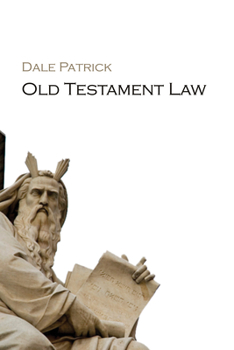Old Testament Law
Dale Patrick examines the first five books of the Bible--the Pentateuch--the Law. He provides an effective method for studying and understanding this vital part of the canon. His introduction concentrates on the exposition of the major thrust of Old Testament Law: the Ten Commandments, the Book of the Covenant, the Deuteronomic Law, the Holiness Code, and the Priestly Law. Law--rules and regulations, concepts and principles, legal codes--written and unwritten. Patrick tackles important questions surrounding the formation of the Law. What is the Law? How was it formulated? What implications does the Law of the Israelites have for Christians today? Patrick's deft handling and answering of these questions results in a book that provides a means to understand the specific rules governing the concepts and principles of the written law so that we may grasp the unwritten law; i.e., the justice, righteousness, and holiness required by God. Patrick offers critical exposition in a format that makes a seemingly difficult and esoteric part of the Bible accessible to the reader. This introductory text serves as a springboard to further study.
Format:Paperback
Language:English
ISBN:1610972414
ISBN13:9781610972413
Release Date:June 2011
Publisher:Wipf & Stock Publishers
Length:288 Pages
Weight:0.85 lbs.
Dimensions:0.6" x 6.6" x 8.5"
Related Subjects
Bible Study Christian Books & Bibles Old Testament Religion Religion & Spirituality TheologyCustomer Reviews
1 rating
Solid Introduction to the Law in the Hebrew Scriptures
Published by Thriftbooks.com User , 21 years ago
It is a shame that this book is out of print. It offers a solid introduction the law in the Hebrew Scriptures Law. Patrick begins the study be reviewing the place of critical scholarship and biblical law. He then moves on to the various 'books' of law in the Hebrew Scriptures dedicating a chapter to the Ten Commandments, the Book of the Covenant, Deuteronomic law, Holiness Code and Priestly Law. He rounds the book off with two final chapters and a postscript. The second to last chapter discusses the difference between written and unwritten law. The author points out that the earliest codes of law were essentially written forms of an unwritten law code (descriptive). He claims that it wasn't until Deuteronomic school that the law became synonymous with the written law (proscriptive). He continues this argument by claiming that with the love commandment (in MK 12.28ff & Pars.) the law reverts `back' to an unwritten law. The final chapter discusses the place of covenant making in Old Testament law. This book seems to cover most of the main issues dealing with the law in the Hebrew Scriptures (at least at the time of its writing) and presents the material in an accessible way. I had two minor complaints of the book. The first criticism I had of the book was the lack of cultural anthropological insights in discussing some of the law codes (especially the laws dealing with the cult). The second criticism may only be my perception, but I seemed to notice a slight prejudice against post-exilic writings (DTRH, Holiness Code, and Priestly Law). These minor quibbles aside this book is a good place to start for learning more about law in the Hebrew Scriptures.






